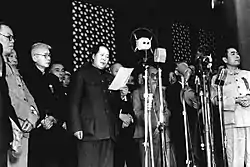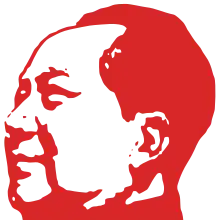Proclamation of the People's Republic of China
The founding of the People's Republic of China (PRC) was formally proclaimed by Mao Zedong, the Chairman of the Communist Party of China, on October 1, 1949 at 3:00 pm in Tiananmen Square in Beijing, the new capital of China (Nanking had been the capital of the former Republic of China). The formation of the Central People's Government of the PRC, the government of the new nation, was officially proclaimed during the proclamation speech at the founding ceremony.
 Mao Zedong proclaiming the foundation of the People's Republic of China on the October 1, 1949. | |
| Native name | 中华人民共和国开国大典 / 中華人民共和國開國典禮 |
|---|---|
| English name | Founding Ceremony of the People's Republic of China |
| Date | October 1, 1949 |
| Venue | Tiananmen Square |
| Location | Beijing, China |
| Participants | Mao Zedong |
| History of the People's Republic of China (PRC) |
|---|
.svg.png.webp) |
| History of |
| Generations of leadership |
|
|
 | ||||||||
|---|---|---|---|---|---|---|---|---|
| ANCIENT | ||||||||
| Neolithic c. 8500 – c. 2070 BCE | ||||||||
| Xia c. 2070 – c. 1600 BCE | ||||||||
| Shang c. 1600 – c. 1046 BCE | ||||||||
| Zhou c. 1046 – 256 BCE | ||||||||
| Western Zhou | ||||||||
| Eastern Zhou | ||||||||
| Spring and Autumn | ||||||||
| Warring States | ||||||||
| IMPERIAL | ||||||||
| Qin 221–207 BCE | ||||||||
| Han 202 BCE – 220 CE | ||||||||
| Western Han | ||||||||
| Xin | ||||||||
| Eastern Han | ||||||||
| Three Kingdoms 220–280 | ||||||||
| Wei, Shu and Wu | ||||||||
| Jin 266–420 | ||||||||
| Western Jin | ||||||||
| Eastern Jin | Sixteen Kingdoms | |||||||
| Northern and Southern dynasties 420–589 | ||||||||
| Sui 581–618 | ||||||||
| Tang 618–907 | ||||||||
| (Wu Zhou 690–705) | ||||||||
| Five Dynasties and Ten Kingdoms 907–979 |
Liao 916–1125 | |||||||
| Song 960–1279 | ||||||||
| Northern Song | Western Xia | |||||||
| Southern Song | Jin | Western Liao | ||||||
| Yuan 1271–1368 | ||||||||
| Ming 1368–1644 | ||||||||
| Qing 1636–1912 | ||||||||
| MODERN | ||||||||
| Republic of China on mainland 1912–1949 | ||||||||
| People's Republic of China 1949–present | ||||||||
| Republic of China on Taiwan 1949–present | ||||||||
The first public military parade of the then new People's Liberation Army took place there, following the chairman's address of the formal foundation of the people's republic. Before this, as the new national anthem March of the Volunteers was played, the new national flag of the People's Republic of China was officially unveiled to the newly founded nation and hoisted for the first time during the celebrations as a 21-gun salute fired in the distance.
Historical background
The Chinese Civil War was fought between the Kuomintang (KMT)-led government of the Republic of China (ROC) and the Communist Party of China (CPC) lasting intermittently between 1927 and 1949. The war is generally divided into two phases with an interlude: from the August 1927 to 1937, the KMT-CPC Alliance collapsed during the Northern Expedition, and the Nationalists controlled most of China. From 1937 to 1945, hostilities were put on hold, and the Second United Front fought the Japanese invasion of China with eventual help from the World War II Allies. The civil war resumed with the Japanese defeat, and the CPC gained the upper hand in the final phase of the war from 1945–1949, generally referred to as the Chinese Communist Revolution.
Major combat in the Chinese Civil War ended in 1949 with the Communist Party in control of most of mainland China, and the Kuomintang retreating offshore, reducing its territory to only Taiwan, Hainan, and their surrounding islands. On 21 September 1949, Communist Party Chairman Mao Zedong announced the establishment of the People's Republic of China with a speech at the First Plenary Session of the Chinese People's Political Consultative Conference.[1][2][3] This was followed by a mass celebration in Tiananmen Square on 1 October, at which the proclamation was made publicly by Mao at the Tiananmen Gate, the date becoming the new country's first National Day.[4]
Declaration
At exactly 3:00pm Beijing Time on 1 October 1949, Chairman Mao Zedong pronounced to the nation from the top of the Tiananmen Gate:
Dear comrades! Today, I hereby declare the formal establishment of the People's Republic of China and its Central People's Government!
After the national anthem had been played, Chairman Mao proclaimed the founding of the People's Republic of China that day on top of the Tiananmen Gate, declaring:
The people throughout China have been plunged into bitter suffering and tribulations since the Chiang Kai-shek Kuomintang reactionary government betrayed the fatherland, colluded with imperialists, and launched the counter-revolutionary war. Fortunately our People's Liberation Army, backed by the whole nation, has been fighting heroically and selflessly to defend the territorial sovereignty of our homeland, to protect the people's lives and property, to relieve the people of their sufferings, and to struggle for their rights, and it eventually wiped out the reactionary troops and overthrew the reactionary rule of the Nationalist government. Now, the People's War of Liberation has been basically won, and the majority of the people in the country have been liberated. On this foundation, the first session of the Chinese People's Political Consultative Conference, composed of delegates of all the democratic parties and people's organization of China, the People's Liberation Army, the various regions and nationalities of the country, and the overseas Chinese and other patriotic elements, has been convened.
Representing the will of the whole nation, [this session of the conference] has enacted the organic law of the Central People's Government of the People's Republic of China, elected Mao Zedong as chairman of the Central People's Government; and Zhu De, Liu Shaoqi, Song Qingling, Li Jishen, Zhang Lan, and Gao Gang as vice chairmen [of the Central People's Government]; and Chen Yi, He Long, Li Lisan, Lin Boqu, Ye Jianying, He Xiangning, Lin Biao, Peng Dehuai, Liu Bocheng, Wu Yuzhang, Xu Xiangqian, Peng Zhen, Bo Yibo, Nie Rongzhen, Zhou Enlai, Dong Biwu, Seypidin, Rao Shushi, Tan Kah-kee [Chen Jiageng], Luo Ronghuan, Deng Zihui, Ulanhu, Xu Deli, Cai Chang, Liu Geping, Ma Yinchu, Chen Yun, Kang Sheng, Lin Feng, Ma Xulun, Guo Moruo, Zhang Yunyi, Deng Xiaoping, Gao Chongmin, Shen Junru, Shen Yanbing, Chen Shutong, Szeto Mei-tong [Situ Meitang], Li Xijiu, Huang Yanpei, Cai Tingkai, Xi Zhongxun, Peng Zemin, Zhang Zhizhong, Fu Zuoyi, Li Zhuchen, Li Zhangda, Zhang Nanxian, Liu Yazi, Zhang Dongsun, and Long Yun as council members to form the Central People's Government Council, proclaimed the founding of the People's Republic of China and decided on Beijing as the capital of the People's Republic of China.
The Central People's Government Council of the People's Republic of China took office today in the capital and unanimously made the following decisions: to proclaim the establishment of the Central People's Government of the People's Republic of China; to adopt the Common Program of the Chinese People's Political Consultative Conference as the policy of the government; to elect Lin Boqu from among the council members as secretary general of the Central People's Government Council; to appoint Zhou Enlai as premier of the Government Administration Council of the Central People's Government and concurrently minister of Foreign Affairs, Mao Zedong as chairman of the People's Revolutionary Military Commission of the Central People's Government, Zhu De as commander-in-chief of the People's Liberation Army, Shen Junru as president of the Supreme People's Court of the Central People's Government, and Luo Ronghuan as procurator general of the Supreme People's Procuratorate of the Central People's Government, and to charge them with the task of the speedy formation of the various organs of the government to carry out the work of the government. At the same time, the Central People's Government Council decided to declare to the governments of all other countries that this government is the sole legal government representing all the people of the People's Republic of China. This government is willing to establish diplomatic relations with any foreign government that is willing to observe the principles of equality, mutual benefit, and mutual respect of territorial integrity and sovereignty.
Beijing, September 1, 1949
Celebrations
The first National Day military parade took place right after the proclamation of the PRC. Commanded by Nie Rongzhen, the Commander of the Northern China Military Region and inspected by Zhu De, the Commander-in-Chief of the PLA, the parade involved around 16,000 PLA officers and personnel.[6] The parade, which was approved in June 1949, was the first large-scale and modern Chinese military parade, with the country having never done a public review of troops before under previous governments. Liu Bocheng proposed to parade directors Yang Chengwu and Tang Yanjie be organized in the Soviet format, having personally witnessed a military parade on Red Square in Moscow. The Northern Military Region Band (now the Central Military Band of the PLA) provided musical accompaniment which included the Military Anthem of the People's Liberation Army’'.
In popular culture
Films depicting the proclamation of the People's Republic of China:
- The Birth of New China (1989)
- The Founding of a Republic (2009)
- My People, My Country (2019)
See also
References
- "The Chinese people have stood up". UCLA Center for East Asian Studies. Archived from the original on 18 February 2009. Retrieved 16 April 2006.
- Peaslee, Amos J. (1956), "Data Regarding the 'People's Republic of China'", Constitutions of Nations, Vol. I, 2nd ed., Dordrecht: Springer, p. 533, ISBN 978-94-017-7125-2
- Chaurasia, Radhey Shyam (2004), History of Modern China, New Delhi: Atlantic, p. 1, ISBN 978-81-269-0315-3
- Ben Westcott; Lily Lee (September 30, 2019). "They were born at the start of Communist China. 70 years later, their country is unrecognizable". CNN.
- – Proclamation of the Central People's Government the People Republic of China]] – The People's Daily, 2 October 1949
- https://timesmachine.nytimes.com/timesmachine/1949/10/02/93548261.html?zoom=15&pageNumber=1
